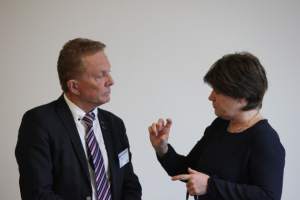 Share this!
Share this!On the occasion of the London Committee 1 plenary meeting, members agreed to organise a study visit on the energy transition in Gelderland (NL) to share and learn from each other’s experiences.
Multistakeholder collaboration
The main focus of the study visit, which will be organised in cooperation with other interregional networks, will be the Gelders’ Energy agreement (GEA). This collaboration between local and regional industries, governments and NGOs’ in the province of Gelderland, Netherlands, has pledged for the province to become energy-neutral by 2050. It facilitates a co-creative process where initiatives, actors, and energy are integrated into society.
A bottom-up approach
The unique nature of the GEA resides in its origin. The initiative sprouted from society when it faced the complex, intricate problems of the energy transition.
The three initiators were GNMF, the Gelders’ environmental protection association, het Klimaatverbond, a national climate association and Alliander, an energy network company. While the provincial government endorses the project, it is not a top-down initiative.
A unique cooperation process
The Gelders’ energy agreement currently brings together 190 partners. Non-governmental organizations, municipalities, provincial government, local and regional businesses work in cooperation on 24 topics to reach these goals. The co-creation process is unique in its nature, and has supported many initiatives already. Examples are solar- and wind parks, local information counters for individual household isolation measures and a clean mobility center.
Involving all sectors for the energy transition
While the Paris Agreement at COP21 illustrated the global commitment to the environment, the GEA is a regional translation of the massive task this commitment implies. The global trend towards fossil free energy resources has significant repercussions at the regional and local level.
The GEA does not only affects households and the design of residential areas, but the public and private space to facilitate wind, water, solar power and geothermal systems. Additionally, it intends to shift the methods of transportations, highlighting the importance of electrification of mobility. Furthermore, businesses also have their part to play, by optimizing and changing their production processes. In that sense, all sectors and aspects of society come together towards energy transition in the organization of the Gelders’ energy agreement.
Goal: Energy neutral province 2050
Organizations in the GEA pledged to take their role in the energy transition towards an energy neutral province in 2050. And they work towards shorter-term goals, such as 14% renewable energy in 2020, and natural gas free in 2035. Renewable energy in the province of Gelderland is currently only 5,5%. These goals are thus a major task and it takes every branch of society to achieve them. In the GEA, all actors gather to take their share in constructing a sustainable region.
Study visit
The Province of Gelderland invites all AER members to take part in a study-visit to get to know this unique multistakeholder collaboration for an energy-neutral Province.
When: 31 October – 2 November
Where: Gelderland, Netherlands
Who is invited: Regions, regional businesses and/or knowledge-institutes
The visit will feature: how GEA works, meeting with regional partners, visiting of sites to share regional good practice and a regional energy game.
 The energy game is a very serious element of the visit and was the highlight of last year’s event on energy at the House of Dutch Provinces which brought together representatives of several regions and organisations. The serious game revealed the diverging interests and need for compromise and negociation in the deployment of any energy strategy. This serious-but-very-enjoyable game is an efficient way to discuss the main competing priorities in terms of energy strategies and learn from each other’s experiences.
The energy game is a very serious element of the visit and was the highlight of last year’s event on energy at the House of Dutch Provinces which brought together representatives of several regions and organisations. The serious game revealed the diverging interests and need for compromise and negociation in the deployment of any energy strategy. This serious-but-very-enjoyable game is an efficient way to discuss the main competing priorities in terms of energy strategies and learn from each other’s experiences.
To participate in the study visit, please contact Daisy Pasanea
Useful links
Photo credits: Karsten Würth
